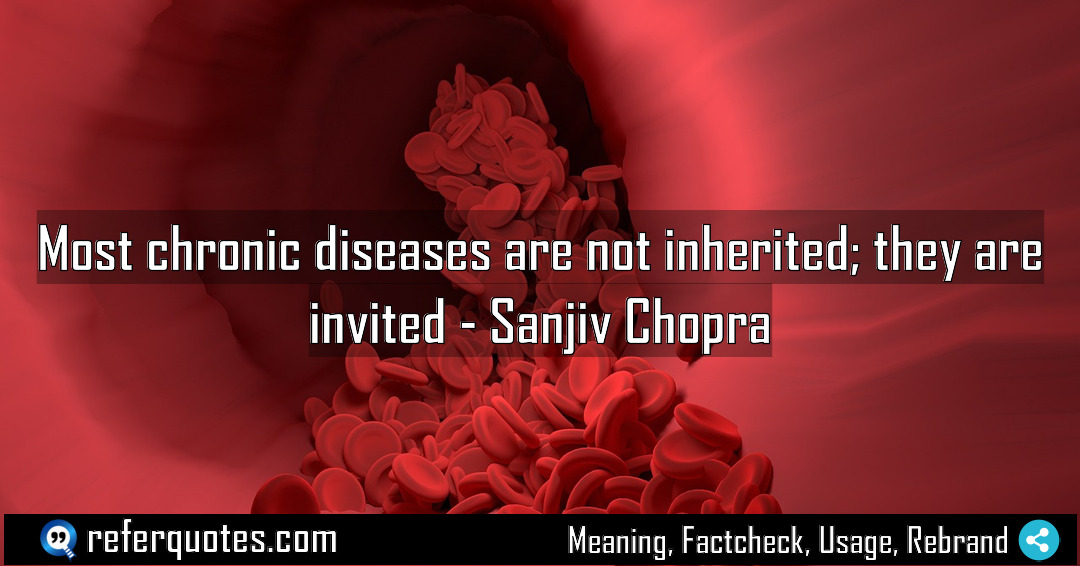
Most chronic diseases are not inherited; they’re invited. It’s a powerful, almost confrontational idea that completely reframes how we think about our long-term health. This isn’t about blaming the patient; it’s about empowering them with the knowledge that their daily choices are the real gatekeepers to wellness.
Share Image Quote:
Table of Contents
Meaning
The core message here is one of radical personal responsibility. It shifts the focus from passive genetics to active lifestyle as the primary driver of most chronic illnesses.
Explanation
Look, I’ve seen this play out for years. We often hide behind family history—”Oh, heart disease runs in my family.” And sure, genetics load the gun. But it’s lifestyleRSVP your body sends out to disease. It’s a cumulative process, not a single event.
Quote Summary
Reading Level70
Aesthetic Score78
Origin & Factcheck
This quote comes straight from the 2012 book Doctor Chopra Says by Sanjiv Chopra, Alan Lotvin, and David Fisher. It’s a modern medical text aimed at debunking health myths, and it’s often, and incorrectly, attributed to the more famous Deepak Chopra. This is a case of mistaken identity—it’s Sanjiv, his brother, who is a renowned hepatologist.
Attribution Summary
Author Bio
Dr Sanjiv Chopra is an American physician, hepatologist, and professor of medicine (emeritus) at Harvard Medical School. He served as Faculty Dean for Continuing Medical Education at Harvard and practiced at Beth Israel Deaconess Medical Center. He writes and speaks on wellness, purpose, longevity, and leadership. The Dr Sanjiv Chopra book list features Leadership by Example, Dr. Chopra Says, The Big Five, The Two Most Important Days, and Brotherhood with his brother Deepak Chopra. He continues to mentor clinicians and inspire general readers through keynotes and media.
| Official Website | Facebook | X| Instagram
Where is this quotation located?
| Quotation | Most chronic diseases are not inherited; they are invited |
| Book Details | Publication Year: 2010; ISBN: 978-0312611742; Last Edition: 1st Edition; Number of Pages: 304. |
| Where is it? | Chapter 8: Myths About Genetics, Approximate page from 2010 edition |
Context
In the book, this statement isn’t meant to shame anyone. It’s used as a powerful setup to discuss the science of epigenetics—how your behaviors can actually turn certain genes on or off. The authors use this provocative line to jolt the reader into paying attention to the practical, actionable advice that follows.
Usage Examples
You can use this to really drive a point home in a few different scenarios:
- With a patient who’s feeling hopeless about their family history: “I know you’re worried about diabetes because your mom had it. But remember what we say: most chronic diseases are not inherited; they are invited. The choices we make today are what really send that invitation.”
- In a wellness workshop or a corporate health talk: “Let’s talk about the invitations we’re sending to our bodies. Are we inviting vitality, or are we inviting illness with our daily routines?” It’s a fantastic, memorable metaphor.
- As a personal mantra for motivation: Seriously, when I’m choosing between the elevator and the stairs, I sometimes think, “What am I inviting into my life right now?” It’s a simple but powerful mental reframe.
To whom it appeals?
Share This Quote Image & Motivate
Motivation Score80
Popularity Score76
Shareability Score75
FAQ
Question: Does this mean genetics don’t matter at all?
Answer: Not at all. Genetics set the stage—they determine your predisposition. But your lifestyle is the director of the play. You have a huge amount of control over how that genetic script gets performed.
Question: Isn’t this quote just blaming people for getting sick?
Answer: I get why you’d think that, but it’s the opposite. Blame is backward-looking and disempowering. This idea is forward-looking and empowering. It says, “You are the host of your health. You get to decide who you invite.” It gives power back to the individual.
Question: What about diseases that are clearly genetic, like Huntington’s?
Answer: That’s a great point, and it’s why the quote says “*Most* chronic diseases.” It’s specifically referring to the big ones like Type 2 diabetes, heart disease, and many cancers, where lifestyle is the dominant factor. It doesn’t apply to purely genetic or autoimmune conditions.
Similar Quotes
You know, “Good health is not simply the absence…” is one of those quotes that flips your entire perspective. It moves the goalposts from just avoiding sickness to actively chasing…
It’s not genetics that determines destiny… it’s a powerful reminder that your daily choices hold more power than your DNA. This is the real secret to shaping your health, career,…
You know, “A healthy lifestyle is built, not bought” perfectly captures a truth we often miss. It’s a powerful reminder that real, lasting health isn’t something you can purchase off…
You know, “Your genetics are not your destiny” is one of those simple but powerful ideas that completely changes the game. It’s about taking control and realizing that your starting…
Medicine can cure, but only lifestyle can heal. That’s the kind of statement that stops you mid-sip of your coffee, isn’t it? It perfectly captures the modern healthcare dilemma we…
